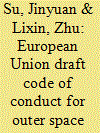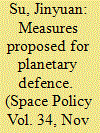|
|
|
Sort Order |
|
|
|
Items / Page
|
|
|
|
|
|
|
| Srl | Item |
| 1 |
ID:
178620


|
|
|
|
|
| Summary/Abstract |
Adjacency, notwithstanding its status as a basis for generating maritime entitlements, has no place as a principle under the existing law of the sea. To endow it with such status in the negotiation of an agreement for the conservation and sustainable use of marine biological diversity in areas beyond national jurisdiction (BBNJ) is likely to upset the delicate balance between the rights of coastal states and those of the international community, which is essential to the widespread acceptance of United Nations Convention on the Law of the Sea (UNCLOS). This article argues that the access regime for marine genetic resources (MGRs) straddling the boundary between areas beyond national jurisdiction (ABNJ) and areas within national jurisdiction (AWNJ) should be location based, and adjacent coastal states should not be accorded preferential rights in the distribution of benefits. However, due regard should be paid to the rights and legitimate interests of adjacent coastal states when transboundary impacts may result from measures adopted for and activities conducted in ABNJ, including those that directly affect MGRs straddling the boundary between ABNJ and AWNJ. At the procedural level, coastal states should be allowed to participate, primarily through prior notification and consultation, in the adoption of area-based management tools (ABMTs) in ABNJ and the conduct of environmental impact assessment (EIA) with respect to activities therein.
|
|
|
|
|
|
|
|
|
|
|
|
|
|
|
|
| 2 |
ID:
132565


|
|
|
|
|
| Publication |
2014.
|
| Summary/Abstract |
The European Union draft Code of Conduct for outer space activities is one of the primary international initiatives, that are currently active, to enhance the safety, security and sustainability of outer space activities. Although the spirit underlying the instrument is commonly shared by space-faring countries, substantial disagreement exists among States as to some of its core provisions. This article proposes that the Code of Conduct should make a clear distinction between commercial activities and military activities, and adopt more balanced measures on the restriction of military activities in outer space.
|
|
|
|
|
|
|
|
|
|
|
|
|
|
|
|
| 3 |
ID:
142583


|
|
|
|
|
| Summary/Abstract |
Whereas the Earth is showered by extraterrestrial matters on a constant basis, most of them cannot survive the very high heat produced in their entry into the atmosphere to make a terrestrial impact. Impacts that are capable of inflicting terrestrial casualties and damages are even rarer. However, their consequences can be high, and even so nowadays with the change of human settlement patterns on the Earth. With the development of space science and technology, human beings are now capable of predicting possible impacts with some accuracy, and even minimizing the chance of actual collision. For the later purpose, many proposals have been put forward, which either employ weapons readily found on the Earth, or envisage newly developed technologies that could nevertheless be used for military purposes. This short note applies existent international law to these measures, and attempts to shed some light on their implications for ongoing discussions of space arms control.
|
|
|
|
|
|
|
|
|
|
|
|
|
|
|
|
| 4 |
ID:
169310


|
|
|
|
|
| Summary/Abstract |
Pakistan was among the first 10 countries to start a space programme. Its space programme started upon the appointment of Dr. Abdus Salam (Noble Prize Winner) as the Chairman of the Space Upper Atmosphere Research Commission (SUPARCO) in 1961. Owing to the prevailing unfavourable economic and political environment, coupled with regional instability and other factors, this programme could not persist for long. Recent efforts to overcome these mistakes and hurdles through an improved domestic strategy and smarter international relations are promising. Notably, success in this area can be ensured only with sustained political commitment to space development. To promote its space activities, Pakistan successfully conducted international cooperation with different countries and organisations. This article examines the Pakistan space programme and its cooperation with other countries, in particular, the shift in partnership from the United States to China.
|
|
|
|
|
|
|
|
|
|
|
|
|
|
|
|
|
|
|
|
|